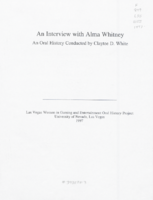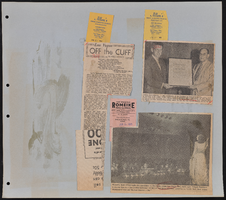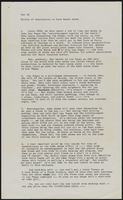Search the Special Collections and Archives Portal
Search Results
Barbara Jean Drew oral history interview
Identifier
Abstract
Oral history interview with Barbara Jean Drew conducted by Claytee D. White on May 17, 2021 for African Americans in Las Vegas: a Collaborative Oral History Project. Barbara Drew is the Dean of the Academy for Ministers, teaches Bible study, and performs other spiritual work at New Jerusalem Worship Center. Drew migrated to Las Vegas from Fortune Fork, Louisiana, just two miles outside the city limits of Tallulah.
This interview covers life in the Black community beginning when Drew arrived in 1961. She spoke about the importance of businesses like the Brown Derby, Hamburger Heaven, and the Town Tavern that hosted jazz on Sunday afternoons with a dance floor that she enjoyed. She discussed her first job running American Linen, a Dry Cleaners owned by Phil Shapiro; Shapiro mentored Drew, teaching her about business operations, purchasing property for her family, bookkeeping, and the importance of having a bank account. She also spoke of a neighborhood where neighbors helped neighbors and opportunities that flourished throughout the Black community. Subjects discussed include: Jackson Ave, Town Tavern, New Jerusalem Worship Center, Kasper Park, Berkley Square, and Phil Shapiro.
Archival Collection
Audio recording clip of interview with Anna Bailey by Claytee D. White, March 3, 1997
Date
Archival Collection
Description
Part of an interview with Anna Bailey by Claytee White on March 3, 1997. Bailey describes her arrival in Las Vegas and opening night at the Moulin Rouge.
Sound

Transcript of interview with Alma Whitney by Claytee D. White, March 3, 1996
Date
Archival Collection
Description
Interview with Alma Whitney conducted by Claytee D. White on March 3, 1996. Seeking better employment opportunities, Whitney moved to Las Vegas from Tallulah, Louisiana, at the age of sixteen. Whitney supported Westside churches and schools and was respected as supervisor in housekeeping at Desert Inn. Whitney provides information on the African American migration to Las Vegas during the 1940s, post-war race relations in Las Vegas, the daily work of hotel maids, and the Culinary Union.
Text

"Thesis Problem: Studying Southern Nevada Migration": manuscript draft by Roosevelt Fitzgerald
Date
Archival Collection
Description
From the Roosevelt Fitzgerald Professional Papers (MS-01082) -- Unpublished manuscripts file.
Text
Shepherd, Henry S.
Henry Shepherd was born and raised on a plantation in Tallulah, Louisiana, where the primary crops were peanuts and corn. When he moved to Las Vegas, Nevada in 1967, he worked as a bartender at the Sands Hotel. Shepherd was able to send his daughter to college because he was working for the Culinary Workers Union Local 226. Leaving the Sands Hotel, he went to the Landmark Hotel and Casino, and then went to Circus Circus Hotel. The Luxor Hotel and Casino was his final stop in a bartending career that spanned over three decades.
Person
Rogers, James M.
Bishop James M. Rogers was born around 1951 and was raised on a plantation in Louisiana near Tallulah, Louisiana. He arrived to Las Vegas, Nevada in 1970 at the age of 19, and was mentored by Dr. F.N. Addison. He also started to attend community rallies and town hall meetings. His initial involvement in the National Association for the Advancement of Colored People (NAACP) happened through supporting his pastor and getting involved in marches and news conferences.
Person
Audio clip from interview with Essie Lee Jones by Claytee White, June 5, 1996
Date
Archival Collection
Description
Part of an interview with Essie Lee Jones, June 5, 1996. In this clip, Jones describes racism she encountered while she was working as a waitress.
Sound



